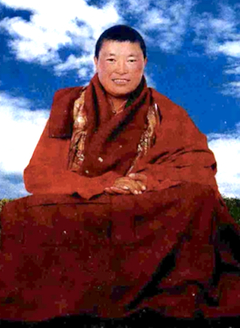Afterword
Afterword to the Memoirs of Delok Tsultrim Wangmo[1]
by Delok Tsultrim Wangmo
འདི་ལྟར་དགེ་སྡིག་བླང་དོར་མངོན་སུམ་དུ། །
མྱོང་བའི་གཟིགས་སྣང་སེམས་ཉིད་སྒྱུ་མའི་འཕྲུལ། །
ཉམ་ཐག་ངན་སོང་འགྲོ་བའི་སྡུག་བསྔལ་གྱི། །
བཟོད་མེད་འཕྲིན་འདི་འཛམ་གླིང་འགྲོ་ལ་བསྐུལ། །
Thus, I experienced vivid visions of the consequences of positive and negative actions,
Which were the illusory emanations of my mind itself.
These anguished writings about the suffering of the miserable denizens of the lower realms,
Are a plea to the beings of the world!
དགེ་བཅུའི་ཁྲིམས་ཀྱིས་འཚོ་བའི་གངས་ཅན་བོད། །
བསམ་ཡོད་སྐྱེ་བོའི་ཡིད་ཀྱི་དཀྱིལ་དུ་ཟུངས། །
བསླུ་མེད་ལས་འབྲས་གནས་ལ་བག་ཡོད་ཀྱིས། །
རང་ཉིད་ཤི་དུས་འགྱོད་པ་མེད་པར་མཛོད། །
Snowy Tibet is nourished by the discipline of the ten virtues.[2]
Thoughtful people, keep this well in mind.
If you are always conscientious of the infallibility of karmic cause and effect,
You will not have regrets when your time comes to die.
སྔོན་ནས་ད་བར་འཁོར་བ་འདིར་འཁྱམས་ཀྱང། །
དོན་ཆེན་གཏན་གྱི་འདུན་མ་གཅིག་མ་འགྲུབ། །
ད་ནི་ལན་གཅིག་མི་ཡི་ལུས་ཐོབ་དུས། །
དགེ་སྒྲུབ་སྡིག་སྤོང་ལས་ལ་བག་ཟོན་མཛོད། །
For so long, we have been wandering in saṃsāra
But we have achieved nothing truly meaningful or lasting.
Now that we finally have a human body,
Let us take no risks when it comes to doing what's good and avoiding what's bad.
དགེའོ། དགེའོ། དགེའོ།། །།
Sādhu sādhu sādhu
| Translated by Joseph McClellan, 2024.
Bibliography
Tsultrim Wangmo (tshul khrims dbang mo). Tshul khrims dbang moʼi ʼdas log rnam thar dngul dkar me long (A Mirror of Polished Silver). Dpal yul rdzong: dpal ya chen o rgyan bsam gtan gling, n.d. BDRC W3CN523. p. 106.
Version: 1.0-20240309
-
Tsultrim Wangmo's memoirs recount her experiences as a delok, or revenant, highlighting her encounters with beings suffering in other realms. ↩
-
(1) To renounce killing, and instead protect life; (2) to renounce taking what is not given, and instead practise generosity; (3) to renounce sexual misconduct, and instead follow the rules of discipline; (4) to renounce lying, and instead tell the truth; (5) to give up sowing discord, and instead reconcile disputes; (6) to abandon harsh speech, and instead speak pleasantly; (7) to renounce worthless chatter, and instead recite prayers; (8) to renounce covetousness, and instead learn to be generous; (9) to give up wishing harm on others, and instead cultivate the desire to help them; (10) to put an end to wrong views, and instead establish in oneself the true and authentic view. ↩
